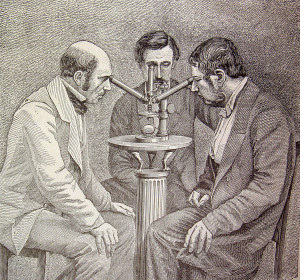Posted by Roberta Grimes • February 22, 2020 • 29 Comments
The Teachings of Jesus, Understanding Reality
Day by day, Day by day,
Oh, Dear Lord, Three things I pray.
To see thee more clearly,
Love thee more dearly,
Follow thee more nearly
Day by day.
– Stephen Schwartz and John-Michael Tubelak, from the 1971 musical “Godspell”
 We have spoken at length about the fact that mainstream science and mainstream Christianity are our two greatest barriers to discovering and making sense of what actually is going on. Each of them holds a worldview that gives careful attention to just its own preferred aspects of reality, and each requires the exclusion of any study of many other aspects of reality that are equally real. For example, Christianity concentrates on what people many hundreds of years ago thought was true about the mental and spiritual aspects of reality, while mainstream science works at making sense of only reality’s physical aspects. Each has a set of established dogmas – statements that adherents are required to believe – which means that neither can be considered to be an open-minded search for the truth. What may be even worse is the fact that a lot of the dogmas they adopt are very hard to believe! For example, nearly all versions of Christianity insist that a perfectly loving God needed the bloody sacrifice of God’s own Son before God could forgive us for Adam’s sin; while science still requires that consciousness must be generated by the brain, when more and more that proposition is being shown to be unlikely, if not impossible.
We have spoken at length about the fact that mainstream science and mainstream Christianity are our two greatest barriers to discovering and making sense of what actually is going on. Each of them holds a worldview that gives careful attention to just its own preferred aspects of reality, and each requires the exclusion of any study of many other aspects of reality that are equally real. For example, Christianity concentrates on what people many hundreds of years ago thought was true about the mental and spiritual aspects of reality, while mainstream science works at making sense of only reality’s physical aspects. Each has a set of established dogmas – statements that adherents are required to believe – which means that neither can be considered to be an open-minded search for the truth. What may be even worse is the fact that a lot of the dogmas they adopt are very hard to believe! For example, nearly all versions of Christianity insist that a perfectly loving God needed the bloody sacrifice of God’s own Son before God could forgive us for Adam’s sin; while science still requires that consciousness must be generated by the brain, when more and more that proposition is being shown to be unlikely, if not impossible.
It is becoming ever more restricting for us to continue to live in the twenty-first century with our two mutually exclusive sources of truth still stuck behind ancient barriers. This artificial division between material and non-material realities goes back as far as Plato and Aristotle! Still, as recently as half a century ago our balancing of these two incompatible approaches to understanding reality was the best that we could do, since no better sources of information were available. It has long been common for us to switch from one approach to the other in our minds, and even to hold incompatible beliefs simultaneously. There once were lots of Christian research  scientists! But recent advances in a variety of fields are bringing us to a place where we can see how all these disciplines readily interact, and indeed how both material and non-material fields of study access the same reality.
scientists! But recent advances in a variety of fields are bringing us to a place where we can see how all these disciplines readily interact, and indeed how both material and non-material fields of study access the same reality.
At last we are able to study one consistent, complete, and up-to-the-minute reality that makes sense across the board! So for us to continue this artificial division between two incompatible ways of approaching only certain parts of the truth has become counterproductive and plain silly. Furthermore, holding to old-style scientific and religious approaches to the study of reality means that:
 deeply fear-based Christianity really is. Science has a similar problem, since science teaches that there is no God, that we are a random accident on a planet in one of billions of solar systems, and that our self-awareness is just a brain-illusion and will die with our bodies. A lot of the reason why the consciousness vibration of this planet is now so debased is that the two institutions that we most trust give us all these tremendous fears.
deeply fear-based Christianity really is. Science has a similar problem, since science teaches that there is no God, that we are a random accident on a planet in one of billions of solar systems, and that our self-awareness is just a brain-illusion and will die with our bodies. A lot of the reason why the consciousness vibration of this planet is now so debased is that the two institutions that we most trust give us all these tremendous fears.There is another problem, too, that is caused by our acceptance of this bifurcation into two independent sources of truth, each of which insists that we believe in its dogmas. In cultures where the established worldview requires that we believe as truth some things for which there is little or no proof, having faith without proof has long been seen to be a virtue. But even a moment’s critical thought will show you that until we begin to demand at least some evidence before we will believe, humankind can never make any progress! Please think about this. If the ability to believe things uncritically because some authority tells us to believe those things is celebrated, and if we even train our children to “just have faith,” then people will soon be believing anything. And a populace that is able to hold beliefs without evidence can be led into untold horrors! Recent history tells us that authorities can create beliefs in their followers’ minds that Native Americans are savages, that darker skin is a mark of inferiority, or that Jews must be eliminated. Current history tells is that children can readily be taught to believe that murdering for religious reasons brings sainthood! And these are only a few examples of the dreadful horrors that can arise from people’s gullible willingness to believe things for which there is no evidence.
Some of this confusion comes from the fact that the word “faith” has two meanings. Its dictionary definition is sometimes given as “a strong belief in something, even without proof,” which is the kind of faith that religions and mainstream science expect us to have in their dogmas. This first kind if faith, I submit to you, is both negative and counterproductive.
 But Jesus spoke of a different kind of faith. When He used the word “faith,” He was talking about “belief in the power of the mind to accomplish some specific act.” For example, when His disciples asked Him why they had been unable to remove a demon from an affected boy, He said, “Because of your lack of faith. I tell all of you with certainty, if you have faith like a grain of mustard seed, you can say to this mountain, ‘Move from here to there,’ and it will move, and nothing will be impossible for you” (MT 17:20).
But Jesus spoke of a different kind of faith. When He used the word “faith,” He was talking about “belief in the power of the mind to accomplish some specific act.” For example, when His disciples asked Him why they had been unable to remove a demon from an affected boy, He said, “Because of your lack of faith. I tell all of you with certainty, if you have faith like a grain of mustard seed, you can say to this mountain, ‘Move from here to there,’ and it will move, and nothing will be impossible for you” (MT 17:20).
Jesus made it plain that in healing people He was using their beliefs in the powers of their own minds when combined with the power of his own to accomplish these healings. For example, when a woman who had long suffered from bleeding touched His garment, expecting that her doing that would heal her, Jesus said to her, “‘Have courage, daughter! Your faith has made you well.’ And from that very hour the woman was well” (MT 9:22). Two blind men approached Him and told Him they believed that He could heal them, and “He touched their eyes and said, ‘According to your faith, let it be done for you’” (MT 9:29). A woman told Him she believed that He could heal her daughter. “Then Jesus answered her, ‘Lady, your faith is great! What you want is granted.’ That very hour her daughter was healed” (MT 15:28). More open-minded modern researchers already have determined that the sort of faith that Jesus asks of us is a way to vastly empower our minds, and it is especially helpful in healing our own bodies. In a more enlightened age, the further empowerment of our minds this way will be seen as a first step toward any kind of healing.
To have faith for the sake of “having faith” – whether it’s faith in an ancient human-like God, or faith in an exclusively material reality – is useless, lazy, and counterproductive.
My fifty-year voyage of discovery began with a search for afterlife evidence, but soon I was led to do wider-ranging investigations which led to the realization that in fact there is just one reality. It all fits together, and it all makes sense! Then in 2013 I was invited to begin a podcast. We all assumed its title would somehow relate to the afterlife; but when I was asked to propose a title, the words that Thomas put into my mind were “Seek Reality.” I was mystified! Eventually, though, I came to see that when our most trusted sources of information are still so profoundly failing us, then each of us is responsible for assembling the evidence and figuring out what is true. We are left to Seek Reality on our own.
 Fortunately, there are of late increasing signs that mainstream science and many versions of Christianity are modulating their insistence on what must be believed by their adherents. This is brand, brand new! For the first time, just in recent years mainstream scientists are showing humility about whether their whole approach might be wrong, and whether their assumption that consciousness is produced by the brain might have been in error all along. They are seeking new ways to get around what long had been seen as insoluble problems, and a few scientific disciplines are even beginning to look beyond their rigid, long-established parameters.
Fortunately, there are of late increasing signs that mainstream science and many versions of Christianity are modulating their insistence on what must be believed by their adherents. This is brand, brand new! For the first time, just in recent years mainstream scientists are showing humility about whether their whole approach might be wrong, and whether their assumption that consciousness is produced by the brain might have been in error all along. They are seeking new ways to get around what long had been seen as insoluble problems, and a few scientific disciplines are even beginning to look beyond their rigid, long-established parameters.
There are people with scientific training, too, who are exploring the non-material aspects of reality, and some of what they are learning is flat astounding. We have talked here about Dr. Bernardo Kastrup, the brilliant young man whose work on the primacy of consciousness may earn him a Nobel Prize. Scientists affiliated with The Discovery Institute have been leading the way in the scientific study of the non-material aspects of reality. And meanwhile, it is estimated that between six and ten thousand churches are closing in the United states each year, while the most optimistic religious prognosis seems to be just that the rise in the number of Americans with no religious affiliation may be slowing. The most ardent evangelical movements are either dying, too, or they are taking fresh root in the buildings being vacated by all those dying churches! And an idea that would have been unthinkable even a decade ago – that our being spiritual requires that we move beyond faith and embrace both science and common sense – is now being openly espoused by one of our greatest spiritual leaders. After I have spent half a century working on both sides of the iron  barrier that used to exist between the study of the material and the study of the non-material, I am astonished by this easy and rapid breaching of that ancient barrier.
barrier that used to exist between the study of the material and the study of the non-material, I am astonished by this easy and rapid breaching of that ancient barrier.
A new day really is dawning! It is ours to help to shape and ours to love, but it is not of our creation. To see it happening is to watch with wonder the work of Spirit moving in the world. We begin to greet with joy our ultimate sunrise.
Morning has broken like the first morning.
Blackbird has spoken like the first bird.
Praise for the singing,
Praise for the morning,
Praise for them springing fresh from the world.
– Eleanor Farjeon (1881-1965), 1931, from “Morning Has Broken”
Dear Roberta,
My name is Tim and i recently have undergone a Spiritually Transformative Experience related to recovery from alcoholism. It required me to connect with God in a way I had never done before and opened doors for me that I never dreamed were there. This has sent me on a search through both spirituality and science to reconcile all that has happened to me.
Subsequently, I have come to many of the same conclusions As you have related to science and religion. Prior to this experience I was an evangelical protestant but I no longer fit that category, or frankly any category of conventional Christian belief. I just don’t fit anywhere anymore. That said, I know Christ is who he said he was but I see it in a much deeper and more expansive way and a way that also is more personal and better grounded in common sense.
I would sure like to talk to you sometime about many of the things I have come to believe. There are not to many people I can talk to about this. I would also like to hear your opinion about a few theological issues.
Thanks for the thoughtful essay.
God Bless
Tim Moon
Oh dear Tim, how fortunate you are! It’s wonderful when God taps you on your shoulder this way and calls you out of your whole prior life and into a much closer walk. I will be happy to talk with you. Just contact me through the green Contact block above, and make sure to give me your correct email address. We’ll come up with a time to talk that works for both of us. And I’ll be eager to see what you are going to be called to next!
Dear Roberta,
Thank you for this treatise on what real faith is. I had not thought of the fact before that Jesus spoke about faith in the context of taking action:
QUOTE: But Jesus spoke of a different kind of faith. When He used the word “faith,” He was talking about “belief in the power of the mind to accomplish some specific act.”
In a different cultural artifact, these passages would be explained as examples of people’s (I don’t like using this term because of the way Western self-help has corrupted its meaning but…) karma, which the Dalai Lama explains to mean taking action and responsibility for and control of our actions.
Jesus isn’t saying just believe in me. He is saying JOIN me!
Mike:
In the past “to believe” or “belief” had indeed its etymological roots in the word “love” as in “to be-love” something.
Faith was total trust in something you could not produce by human means. Or could only produced by someone else. A result produced outside yourself.
To believe or have faith in something was never actually meant to be “an ascent to intellectual propositions.”
That’s a rather modern meaning, not an historical one. Dogmas therefore do not fit in any really old meaning of the original words that have been translated as faith and belief.
This is why I call Darwinism a religious cult. It has horrible fake news dogmas.
Dear Adri, thank you for that interesting etymological note! I don’t know what the history of the word “faith” over the last 2000 years might be, but I think based on some of my reading that the word “faith” in the religious sense of believing what we are told about God has a rather long history. The word “dogma,” too, has religious roots, and years ago when I would refer to the fact that materialism is the core scientific dogma I would get some push-back. But not any more! Indeed, not just Darwinism but the whole of modern science – to the extent that it insists that reality is matter-based – is a religious cult based in atheism. And a highly damaging one! It has set back and stunted all scientific inquiry for at least the past long, bleak century.
Are you familiar with the great work of another Dutchman? His name is Dr. Pim van Lommel. You can find him speaking (in English) on YouTube. He has his own website as well. https://pimvanlommel.nl/en/
I have a friend in the Intelligent Design movement (Discovery Institute) in Seattle; they are indeed doing fantastic breakthrough work there, and have Darwinists shaking in their boots, and hopefully soon out of their materialistic boots altogether!
In my own research work in the world of numbers, it has also become more than apparent that a great and beautifully ordered Intelligence is behind numbers. Numbers simply cannot be a mere human invention. Brothers Richard and Robin Heath, as well as Jean Martineau have shown that the amazing numbers and ratios in our solar system also are no coincidence.
I like Darwinists explain to me why I get goosebumps and feel ecstatic when I hear beautiful music, or why my watch stopped at the hour and minute my mother died? Or how Brahms got his musical inspirations; he wrote to a friend that he would be admitted to a mental hospital if he revealed the angelic visits? Or why I cough when something gets stuck in my throat? Did we die first of choking and then developed a coughing mechanism? The entire question of irreducible complexity has Darwinists more and more baffled; yet, they stubbornly hold onto their religious dogmas (yes you can call Darwinism a religion or cult) as if their and the world’s salvation depended on it.
Luckily, as you point out, in the face of indeed mounting evidence to the Darwinists’ contrary, more and more scholars are signing “out of that closet” declarations. Amen to that!
Adri, I agree with you that van Lommel and the others you mentioned are doing great work! Reading their published papers and articles is a remarkable experience. Highly recommended to everyone.
Dear Adri, Dr. van Lommel is one of the greatest forces worldwide in the work of figuring out at last what actually is going on, and another countryman of yours doing beautiful work is Dr. Bernardo Kastrup. He has twice been my guest on Seek Reality, and he will be back on again shortly. Bernardo is doing visionary work in the field of consciousness research, and he is my bet to win an ultimate Nobel Prize as the father of a consciousness theory of everything.
Actually, I consider the fact that the universe and a lot of what is material can be studied mathematically to be what will be seen in retrospect to have been the great smoking gun that indicates that indeed the universe is designed by a greater Intelligence. Mathematics itself is clearly an invented science! No less a light than my own Algebra II teacher insisted to me that math was invented and not discovered, and this was back when I was in the tenth grade!
I agree that the fact that modern scientists still so stubbornly cling to their materialist dogmas is baffling, but the problem seems to be that after more than a century of limited and bastardized scientific research, their careers are pretty heavily invested in and built on a lot of bogus work. Their prayer at this point seems to be, “Let me just get the kids educated and my retirement funded before all heck breaks loose!”
l agree. Many of these people aren’t interested in new discoveries – just their paycheck. The Gary Schwartzes in the world are few and far between. There are also those who don’t want to admit that all this time, they have been looking in the wrong areas, and have literally wasted a lot of time.
So true, dear Lola! Nobody living has ever seen a time when mainstream scientists competed in doing basic research and coming up with exciting new discoveries. Might Max Planck have been the last scientist who won a Nobel Prize for something that turned out to have been a very basic discovery in physics that stood the test of time? The twentieth century was a century of refining, proposing un-testable and probably bogus theories (string theory, anyone?), and advancing ever more useful tech gadgets. Oh, how mighty science has fallen in the past century!
Max Planck is my idol. I can’t even come close to him in the brains department. but if he was around today it would be so awesome. I know he wouldn’t stay in the “safe” areas of science. .
Max Planck actually used quantum mechanics to discover that what we experience as consciousness must be primary and pre-existent. It was the greatest discovery of the twentieth century, but to this day mainstream science’s gatekeepers celebrate him while ignoring his greatest achievement!
Dear Roberta. What indeed is true faith? Would it be a faith based on knowledge gained through actual experience, what the ancients sometimes called gnosis? Before they were mostly eliminated by Christianity, the ancient mysteries had developed “technologies” that allowed people to experience things like induced afterdeath communication, clairvoyance, dream incubation, and possibly even chemically induced OBE’s, if not full blown NDE’s (apparently a dangerous process that used some sort of drug which may sometimes have proved fatal). The “gnosis” thus produced was still couched in the mythologies of the day, passed down from who knows how far in the past, and was only for the few.
With the new afterlife research results and the new afterlife communication modalities and technologies coming into play, what kind of new gnosis might we see, free of the preconceptions of the past and open to all, not just the lucky initiates? How would people act in the world and create a new world with that kind of faith? Is that what Jesus was getting at?
Dear Scott, I appreciate your very well done defense of “faith.” If anyone can defend it, you can!
But the problem is that “faith” is so broad a term, and it can have such disastrous results. I have faith that my car will start this morning, despite the cold; I have faith that the check I’m expecting will finally arrive; I have faith that my husband won’t forget the milk when he stops at the store. In each case, I have no proof. In each case, my “faith” may enhance the surprisingly creative powers of my mind to make it more likely that what I want will happen. But this sort of belief without evidence is just comforting. I doubt that it really changes anything.
And “faith,” too, in their own powers and in the weakness of the other side can inspire leaders bent on conquest to set their armies marching. “Faith” can inspire suicide bombers to strap on belts or take over planes and fly them into buildings. “Faith” can inspire parents to deny their children medical care because they have faith that God will cure them. All over the world there are people who have “faith” in all sorts of things, in so many bogus ideas; and that very faith is what keeps them from seeking the genuine truth, and the genuine God.
Jesus used the word “faith” only in the narrow case of the empowerment of our minds to heal. For the rest, Jesus urged us to SEEK, and to keep on seeking. He didn’t want us to have dogmas to believe in, but rather it is clear from His words that He envisioned our relationship with the genuine Godhead to be endlessly growing and evolving. He said, “Ask, and it will be given to you; seek, and you will find; knock, and it will be opened to you. For everyone who asks receives, and he who seeks finds, and to him who knocks it will be opened” (MT 7:7-8).
We still don’t know enough, dear Scott. We still cannot really claim sufficient gnosis. When we stop believing comforting things, and instead we trust God and trust the Lord enough to spend our lives seeking an ever closer walk, just imagine what new and glorious truths we’ll have in store!
Thanks Roberta. You’re right, faith is kind of a loaded word, and I admit gnosis is kind of an obscure one, a word which implies direct revelation from spirit. I feel that the best path is to combine revelation with the discernment of the rational mind, to question and test what is received. That’s where the scientific method shines. I have always loved the way you put it – to “seek reality.” That to me is the joyful path of gnosis in a nutshell. After all, it’s about the journey, not the destination, the ever closer walk as you you so aptly put it, right? It is the “never ending story” that will never get boring, or like you always say at the end of your interviews, it never began and it never will end. My guides have implied that even Brother Jesus does not know the beginning and end of all things, and I guess that makes sense.
(PS. As a practice, I have started thanking Jesus every day for helping me to understand and follow the Way as he taught it and envisioned it. As you quoted above, He told us to ask, and it occurred to me that not violating our free will probaby means that he would need us to ask. Does that make sense?)
Scott: I think your comment about needing to ask just about says it all. I firmly believe that a sincere intent to find the answer to just about anything is crucial, and that this would be necessary before we can expect any answers to come to us. It wouldn’t have any effect if someone was sent a sign if they had no interest in seeking the answer to anything, as they wouldn’t even recognize a “sign” as such. I believe the universe is somehow “connected,” but if we ignore the connection, we cannot see the symbiotic relationship that exists. I believe that’s what Jesus meant when he said “ask and you will receive.”
What you say makes sense Lola. Thanks
Does that “ask, and it will be given…” quote mean everyone gets what they truly want in life?
Not material things, Ali! Jesus didn’t care about material wealth. But I do think Jesus is telling us that if we ask for spiritual wealth, we will in fact receive it, which is amazing. It’s the only thing we really can take with us!
Prov: 29:18
18 Where there is no revelation, people cast off restraint; but blessed is the one who heeds wisdom’s instruction.
Faith, the way I understand it is being able to have insight into the future, either good or bad. I prefer the good of course. When I keep my eyes open gazing upon Jesus and His will, I see a very good thing for the people who are willing to follow Him and what He says, and does.
Without faith in Jesus, there just is no insight as to what is going on, we can live like we do, but as I see it, it is futile to do so.
Luke 6:39
39 He also told them this parable: “Can the blind lead the blind? Will they not both fall into a pit?
Jesus taught us to love one another. I see that life is so much better when we do that. Joy, peace, and happiness, and so much more. Looks pretty good to me. I love the Lord!!!!
Yes, dear Rockey, when we immerse ourselves in the genuine teachings of Jesus, we do tend to fall in love. It is all so simple, so powerful, so beautiful! It makes us crave an ever closer walk with Jesus, to ever more internalize Him and be ever more like Him, which was why I began this post with those words from “Godspell.” I’m right there with you!
Roberta, I really appreciated your comments regarding the concept of faith. Too many Christians think Jesus took on a human existence to wave a magic wand and impress us with the power of God. They fail to understand that individual faith was a significant contributing factor in all the miraculous healings cited in the Bible.
Yes, dear Tom, and I find that astonishing, don’t you? Very few members of Christian congregations ever actually read the Gospel words, or they would come to see things a great deal differently than they do now!
“Jesus used the word ‘faith’ only in the case of empowerment of our minds to heal. For the rest, Jesus urged us to SEEK, and to keep on seeking.”
Dearest Roberta, your words above crystallize much about the concept of ‘faith.’ They also reveal what people generally don’t understand about it. It’s practical and it is primarily transformational for our minds. And when faith is applied this way it is a sign of our spiritual growth. I’ve seen evidence of this kind of faith; I’ve seen it actually work.
So real faith is not blind; it can be tested and provides results. The real thing is by contrast, open eyed. For the rest of our doings there is seeking. So faith and seeking are two things that go hand in hand…
This is far from the convoluted, change adverse, quixotic, martyrdom infused, violence inducing, blind walk in the dark concept that people commonly refer to as ‘faith.’
How could the world be so blind? And how could we not see that the seeking Jesus talked about, involves further revelation, deeper understanding and of course, science?
Beautifully said, dear Efrem – I echo every syllable! Faith and seeking do go hand in hand. And faith cannot be blind, but rather it is the mind’s embrace of what its seeking has found to be true!
🙏🏼❣️🌅
“The real thing is by contrast open-eyed” about summarizes the difference, dear Efrem! I wish I had said that. Genuine faith is spiritual confidence based upon the fruits of our earnest seeking, while religious faith is just mindless hoping. All so very well said – thank you!
Yes. faith and awareness. Awareness is very important
True! 👍❣️🌅